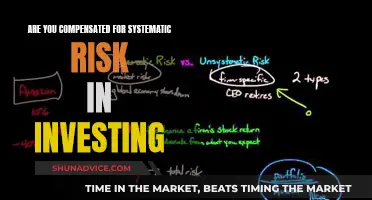
An MBA in Investment Management is a postgraduate degree that prepares graduates for careers in the financial sector. The course equips students with the skills and knowledge to make profitable investments and address complex financial problems faced by leading global firms. The curriculum covers current financial theories, practices, and strategies for investment management and analysis. Students learn about portfolio management, security markets, capital asset pricing, risk tolerance, and mergers and acquisitions. The course also covers the Chartered Financial Analyst (CFA) curriculum, which is one of the most sought-after professional designations in business. Graduates of MBA Investment Management programs can pursue careers in investment banking, asset management, hedge funds, or management consulting.
What You'll Learn

Portfolio management
Portfolio managers, who often start their careers as financial analysts, are responsible for supervising investment portfolios. They manage teams of analysts, collaborate with clients to set financial goals, and continuously monitor the performance of the investment mix. Effective portfolio management demands a clear understanding of the financial markets, investment theories, and strategies such as trading, risk management, and corporate governance.
The University of Southern California (Marshall), University of Utah (Eccles), and Rice University (Jones) are among the top institutions offering online MBA programs with a concentration in portfolio management. These programs provide students with a well-rounded business education, equipping them with the knowledge and skills necessary for successful portfolio management.
Overall, portfolio management is a dynamic and challenging field that plays a crucial role in the financial industry. It requires a strong foundation in investment knowledge, analytical skills, and an understanding of risk and return trade-offs to make informed investment decisions.
Becoming a Financial Analyst: Planning and Investment Strategies
You may want to see also

Security markets
The efficient functioning of security markets relies on several key factors. Firstly, transparency and disclosure of relevant information are essential. Participants in these markets need access to accurate and timely information about the securities being traded, such as financial statements, performance metrics, and regulatory filings. This transparency helps investors make educated decisions and facilitates price discovery.
Secondly, the regulatory framework plays a pivotal role in maintaining the integrity of security markets. Government agencies and self-regulatory organisations establish rules and guidelines to ensure fair and orderly trading, protect investors, and promote market stability. These regulations cover areas such as disclosure requirements, trading practices, and market manipulation. Adherence to these regulations is closely monitored to maintain the confidence of market participants.
Another critical aspect of security markets is the role of intermediaries. These include brokers, dealers, and investment banks, who act as facilitators between buyers and sellers. They provide services such as trade execution, investment advice, and market research. Intermediaries contribute to market liquidity, facilitate price discovery, and help investors navigate the complexities of the market.
Understanding security markets is essential for investment managers as it enables them to navigate the complex landscape of investment options, assess risk and return potential, and make informed decisions on behalf of their clients. Investment managers need to stay abreast of market trends, analyse security performance, and consider macroeconomic factors influencing the markets. By doing so, they can construct well-diversified portfolios that meet their clients' investment objectives and risk tolerances.
Acron's Aggressive Portfolio: High-Risk, High-Reward Strategy
You may want to see also

Risk tolerance
An investor's risk tolerance plays a crucial role in determining the types and amounts of investments they choose to make. Those with a higher risk tolerance tend to invest in stocks, equity funds, and exchange-traded funds (ETFs), while those with a lower risk tolerance often opt for bonds, bond funds, income funds, or guaranteed investments.
There are three main categories of investors based on their risk tolerance: aggressive, moderate, and conservative. Aggressive investors have a high-risk tolerance and are willing to risk losing money for the potential of better returns. They tend to be market-savvy and focus on capital appreciation. Their investments usually include stocks, with little to no allocation to bonds or cash. Moderate investors, on the other hand, aim to balance opportunities and risks. They typically create a portfolio with a mix of stocks and bonds, such as a 50/50 or 60/40 structure.
Conservative investors have a lower risk tolerance and seek investments with guaranteed returns. They are willing to accept minimal to no volatility in their portfolios. This group often includes retirees or those approaching retirement age, as they may be unwilling to risk losing their principal investment. Conservative investors often choose low-risk options such as bank certificates of deposit (CDs), money markets, or U.S. Treasuries to preserve their capital.
The time horizon for an investment is another critical factor influencing risk tolerance. Investors with long-term financial goals, such as retirement planning, can generally tolerate more risk since their investments have more time to recover from potential downturns. In contrast, shorter-term goals, like saving for a down payment on a house, require a more conservative approach to ensure the funds are available when needed.
In addition to time horizons, other factors such as age, income, and financial goals also play a role in determining an investor's risk tolerance. Younger individuals, for example, may have a higher risk tolerance due to their ability to earn more money and their longer time horizon. Similarly, investors with higher incomes or substantial portfolios may be more tolerant of risk since they can afford potential losses.
Equilibrium Economics: Savings-Investment Identity
You may want to see also

Mergers and acquisitions
An MBA in Mergers and Acquisitions can help you develop the skills and knowledge to navigate the complexities of M&A and corporate restructuring. This includes understanding the legal, financial, and strategic challenges related to M&A. The curriculum covers both theoretical and practical aspects, such as financial theory, quantitative tools, and their application in real-world scenarios.
- Mergers and Acquisitions course: This course covers the challenges and opportunities that companies face during restructuring, including valuation, negotiation, antitrust issues, and managing integration. Students learn to create basic merger models and understand deal-structuring and post-merger integration.
- Structuring and Leading Deals: This course provides insights into the stages of a deal, risk mitigation strategies, and the legal aspects of acquisitions and mergers. It covers different types of acquisitions and mergers, such as domestic vs. cross-border acquisitions and friendly vs. hostile takeovers.
- Cost Analysis and Negotiation Techniques: Students are taught to analyze cost proposals and develop cost objectives using various methods, including contract audits, estimating processes, and cost/price analysis. Federal regulations and relevant case studies are also explored.
- Acquisition and Contract Law: Focusing on the legal aspects of M&A, this course covers topics such as antitrust considerations, accounting and tax issues, anti-takeover defenses, federal securities law, and shareholder rights.
- Advanced Corporate Finance: Through case studies, students learn how to apply theoretical concepts and tools from corporate finance to real-world problems. This includes financial forecasting, cost of capital, capital budgeting, and dividend policy.
- Financial Risk Management: This course provides an introduction to identifying, measuring, and controlling risk exposure in financial institutions. It covers market and credit risks, operational and legal risks, and the use of derivatives for risk management.
- Investment Management: Students gain knowledge and skills in portfolio management, security markets, capital asset pricing, risk tolerance, and corporate restructuring.
The skills developed through an MBA in Mergers and Acquisitions are highly valued in the job market, with graduates pursuing careers in consulting, private equity, investment banking, and corporate development. The role of an M&A professional is challenging and rewarding, requiring a unique blend of sales, financial analytics, and strong business acumen.
Invest Your Savings Wisely: The Power of ETFs
You may want to see also

Corporate restructuring
The process of corporate restructuring can involve a range of transactions, including mergers and acquisitions, divestitures, leveraged buyouts, private equity deals, financial restructurings, and bankruptcy reorganizations. The main valuation methods used to evaluate these transactions are:
- DCF valuation
- Trading and transaction multiples valuation
- Premiums paid analysis
The course offered by Carnegie Mellon University's Tepper School of Business provides an understanding of the economic, financial, and strategic reasons behind corporate restructurings and the empirical evidence surrounding them.
A company may undergo corporate restructuring to enhance shareholder value, reorganize or divest less profitable businesses, and take advantage of tax breaks. It can also involve changes to corporate management, the sale of underutilized assets, outsourcing of certain operations, and moving manufacturing to lower-cost locations.
Overall, corporate restructuring is a complex process that requires a careful evaluation of a company's portfolio of businesses and asset arrangements to identify opportunities for improvement and growth.
National Saving Certificates: Smart Investment Strategies
You may want to see also
Frequently asked questions
An MBA in Investment Management is a Master of Business Administration program that equips students with the tools, experiences, and connections to make superior investment gains. The program covers all business disciplines and teaches students how to analyze complex financial problems faced by leading global firms.
An MBA in Investment Management prepares students for a successful career in investment banking, asset management, hedge funds, or management consulting. The program provides students with an insider's view of global finance and the opportunity to intern with top brokerage houses or investment firms.
Graduates with an MBA in Investment Management can pursue careers in various fields, including investment banking, asset management, wealth management, and financial consulting. They can work as acquisitions managers, chief financial officers, financial consultants, financial planning and analysis managers, investment banking associates, or risk and insurance analysts.







